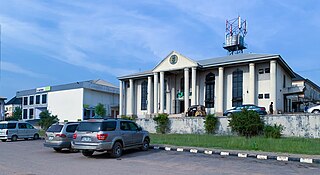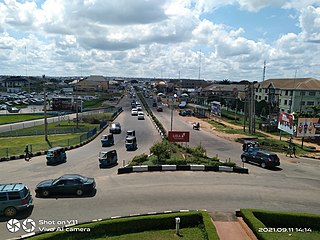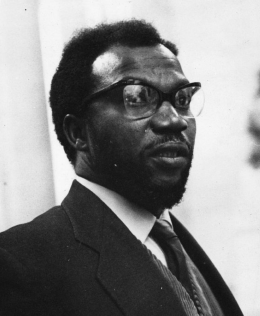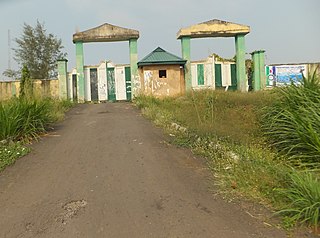Related Research Articles

The Igbo people are an ethnic group found in Nigeria, Cameroon, Gabon, and Equatorial Guinea. Their primary origin is found in modern day Abia, Anambra, Ebonyi, Enugu, Imo State, Delta and Rivers, some parts of Cross-River State while others can be found in the Bayelsa, Akwa-ibom and Kogi States. The Igbo people are one of the largest ethnic groups in Africa.

Onitsha is a city on the eastern bank of the Niger River, in Anambra State, Nigeria. Onitsha along with various cities and towns in southern Anambra State, northern Imo State and neighboring Delta State on the western bank of the Niger River, form a continuous metropolitan area.

Anambra State is a Nigerian state located in the South-eastern region of the country. The state was created on 27 August 1991. Anambra state is bounded by Delta State to the west, Imo State and Rivers State to the south, Enugu State to the east and Kogi State to the north. The state's capital is Awka, while the state’s largest city is Onitsha which is regarded as one of the largest metropolises in Africa. Nnewi is the second largest commercial and industrial city in Anambra State, and also a known automobile hub within Nigeria and Africa.

Asaba is an Igbo town and the capital of Delta State, Nigeria. A rapidly growing urban area, it is located on the western bank of the Niger River, in the Oshimili South Local Government Area. Asaba had a population of 149,603 as at the 2006 census, and a fast growing metropolitan population of over half a million people.

The Eastern Region was an administrative region in Nigeria, dating back originally from the division of the colony Southern Nigeria in 1954. Its first capital was Calabar. The capital was later moved to Enugu and the second capital was Umuahia. The region was officially divided in 1967 into three new states, the East-Central State, Rivers State and South-Eastern State. East-Central State had its capital at Enugu, which is now part of Enugu State.
Ogidi is an Igbo-speaking town and the headquarters of Idemili North Local Government area, Anambra State, Nigeria. It has an estimated population of 70,000 people and share boundaries with neighbouring towns like Abatete, Eziowelle, Ṅkpọr, Ụmụnnachị, Ụmụoji, Ogbụnike and Ụmụdiọka.
The Aba Women's War of 1929 were a period of unrest in colonial Nigeria in November 1929. The protests broke out when thousands of Igbo women from the Bende District, Umuahia and other places in southeastern Nigeria traveled to the town of Oloko to protest against the Warrant Chiefs, whom they accused of restricting the role of women in the government. The protest encompassed women from six ethnic groups.

Igbo land is a cultural and common linguistic region in southeastern Nigeria which is the indigenous homeland of the Igbo people. Geographically, it is divided into two sections by; eastern and western.Its population is characterized by the diverse Igbo culture
The Anioma people are a subgroup of igbo people predominantly indigenous to present day Delta State, Nigeria, The Anioma people encompass and are native to the nine northeastern Local Government Areas of Delta State and the Ika-Igbo communities of Edo State. Politically, the Anioma occupy the Delta North Senatorial District where they are the majority group.

Odinigwe Benedict Chukwukadibia Enwonwu MBE, better known as Ben Enwonwu, was a Nigerian painter and sculptor. Arguably the most influential African artist of the 20th century, his pioneering career opened the way for the postcolonial proliferation and increased visibility of modern African art. He was one of the first African artists to win critical acclaim, having exhibited in august exhibition spaces in Europe and the United States and listed in international directories of contemporary art. Since 1950, Enwonwu was celebrated as "Africa's Greatest Artist" by the international media and his fame was used to enlist support for Black Nationalists movement all over the world. The Enwonwu crater on the planet Mercury is named in his honour.

The history of the territories which since ca. 1900 have been known under the name of Nigeria during the pre-colonial period was dominated by several powerful West African kingdoms or empires, such as the Oyo Empire and the Islamic Kanem-Bornu Empire in the northeast, and the Igbo kingdom of Onitsha in the southeast and various Hausa-Fulani kingdoms.
Omu or OMU may refer to:
Ogbaru is a local government area in Anambra State, south-central Nigeria. The area's local government headquarters is in the port city of Atani. It is part of the Greater Onitsha Metropolis.
The Anglican Diocese on the Niger is the mother diocese of the Church of Nigeria. It is one of 10 Anglican dioceses in the Anglican Province of the Niger within the Church of Nigeria. The diocese was created in 1864 as the 'Diocese of West African Territories Beyond the British Dominions' or 'Diocese of the Niger' with Bishop Samuel Ajayi Crowther as the bishop. At Crowther's death in 1891, the diocese was merged with the Lagos and Yoruba sections of the Nigerian mission which had been under the Diocese of Sierra Leone and renamed 'the Diocese of Western Equatorial Africa' with Bishop John Sidney Hill as bishop. He was succeeded by Bishop Herbert Tugwell. In 1920 the Diocese of Equatorial West Africa was divided into two: an eastern part and a western part. A part of the Diocese on the Niger was subsequently carved out in 1946 to create the Niger Delta Diocese.

Anaku is one of the administrative divisions of Anambra State, South-Eastern Nigeria. The town lies 6°15' North of the Equator and 6°44' East of the Greenwich Meridian. It is bordered by "Omabala," the native name of the Anambra River, which is a tributary of the River Niger (North), Aguleri, Ezu River (South), Omor and Umuerum communities (East).
John Cross Anyogu was a Nigerian clergyman who, on 9 June 1957, became the first member of his Igbo community to be consecrated a Roman Catholic priest and later a Roman Catholic bishop. He was also the first Igbo to be ordained a priest in 1930 and the first bishop of the Roman Catholic Diocese of Enugu which was created in 1963, the year of his installation. Through his efforts Enugu became a very important Catholic mission centre overseeing several thousand Christians in and around the town. His parish has the largest concentration of Catholics in Nigeria, second only to Owerri parish.
Nwando Achebe is a Nigerian-American academic, academic administrator, feminist scholar, and multi-award-winning historian. She is the Jack and Margaret Sweet Endowed Professor of History and the Associate Dean for Diversity, Equity, and Inclusion in the College of Social Science at Michigan State University. She is also founding editor-in-chief of the Journal of West African History. 19th Century, 20th Century, Cultural, Political, Religious, Social, Women & Gender
Nwagboka, or Onye-isi Ikporo-Onicha was a Nigerian queen, the last omu (Queen) of Onitsha.
Nwanyeruwa, also known as Madame Nwanyeruwa, was an Igbo woman living in colonial Nigeria who gained prominence for her role in the Aba Women's Riots, better known as the Women's War. The revolt stemmed for the reluctance of Nigerian women to be taxed amidst the economic hardships of the Great Depression. After a scuffle with a male Igbo Warrant Officer, Nwanyeruwa organized 10,000 Nigerian woman in a protest against the colonial and native authorities. While the protest did not result in much concrete changes or acceptance of Nwanyeruwa's demands, it did result in woman being involved in the colonial Nigerian political system. Nwanyeruwa's actions have been appraised by several historians, who cite her actions as an important milestone in the history of African nationalism.

Mary Nzimiro, birthname Mary Nwametu Onumonu, MBE (1898–1993) was a pioneering Nigerian businesswoman, politician and women's activist. In 1948, she was appointed principal representative of the United Africa Company (UAC) for Eastern Nigeria, while maintaining textile and cosmetics retail outlets of her own in Port Harcourt, Aba and Owerri. By the early 1950s, she was among the richest individuals in West Africa, becoming a resident of the exclusive Bernard Carr Street in Port Harcourt. On the political front, she was a member of the influential National Council of Nigeria and the Cameroons, becoming a member of its executive committee in 1957 and vice-president of the NCNC Eastern Women's Association in 1962. During the Nigerian Civil War (1967–1970), she organized Igbo women in support of the Biafrans. As a result she lost most of her property in Port Harcourt and returned to her native Oguta where she died in 1993.
References
- 1 2 3 4 5 Commire, Anne, ed. (1999). "Okwei of Osomari (1872–1943)". Women in World History: A Biographical Encyclopedia . Waterford, Connecticut: Yorkin Publications. ISBN 0-7876-4080-8.
- ↑ Aka, Jubril Olabode (2012). "Madam Omu Okwei". Nigerian Women of Distinction, Honour and Exemplary Presidential Qualities. Trafford Publishing. p. 176. ISBN 978-1-4669-1554-1.
- ↑ Chuku, Gloria (2013). The Igbo Intellectual Tradition: Creative Conflict in African and African Diasporic Thought. New York: Palgrave Macmillan. p. 16. ISBN 978-1-137-31129-0.
- ↑ Uglow, Jenni S., ed. (1985). "Okwei, Omu". The International Dictionary of Women's Biography. New York: Continuum. p. 352. ISBN 0-8264-0192-9.
- ↑ Dan Anazi (7 November 2020). "ikstarr-Without artistic integrity you have no legacy". The Guardian Newspaper. The Guardian Newspaper. Retrieved 22 November 2020.